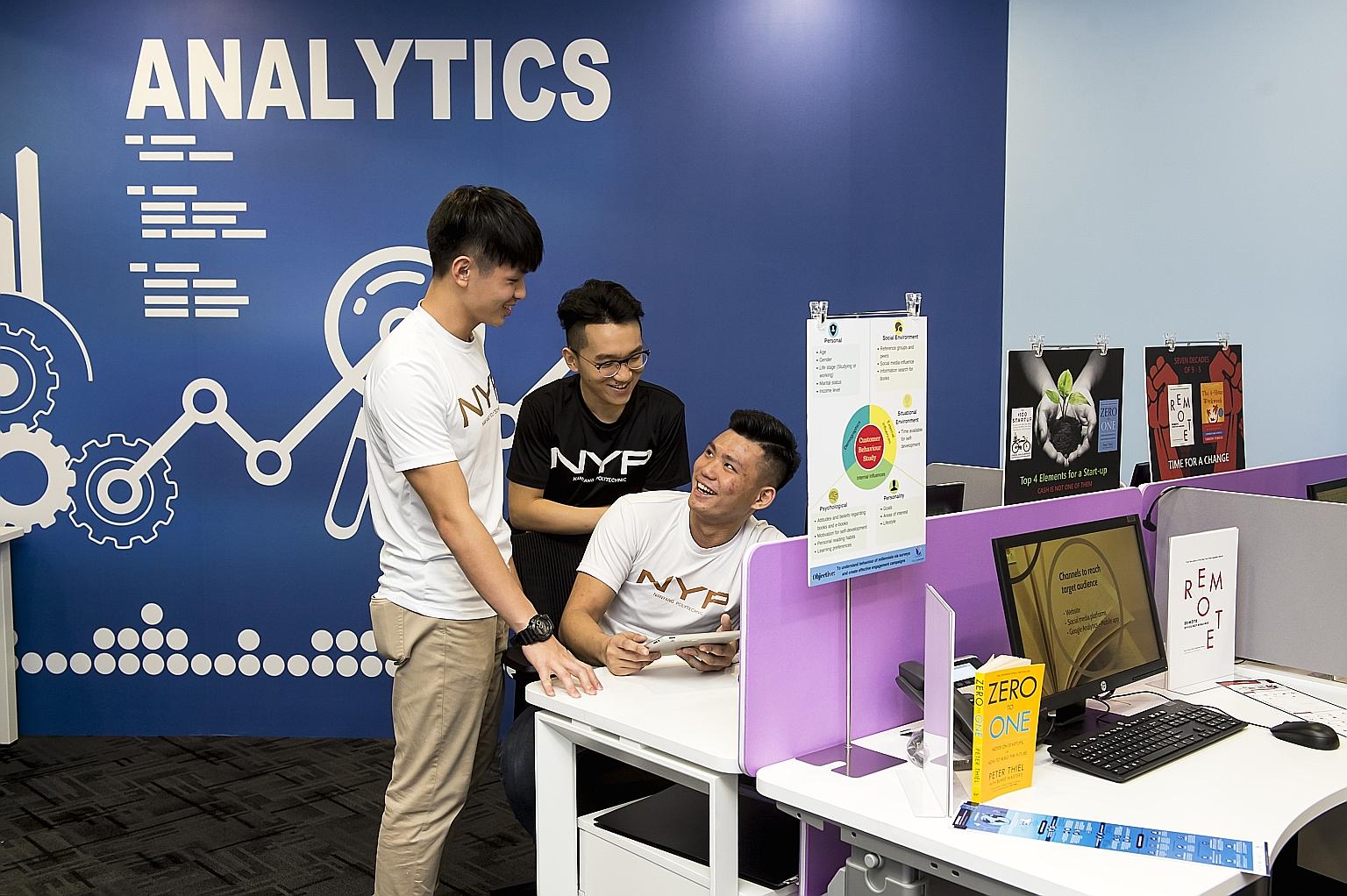Nanyang Poly revamps teaching by breaking down subject boundaries
To boost industry relevance, students will tackle multi-disciplinary tasks from first year
Sign up now: Get tips on how to help your child succeed

Nanyang Poly students working on a group project last year before the Covid-19 outbreak. Under the new approach, they will take on multi-disciplinary tasks or projects that combine several subjects and skills.
PHOTO: NANYANG POLYTECHNIC
A polytechnic is introducing changes in its teaching approach that will see students work on projects that involve several subjects and skills from the get-go, similar to what employees in industry have to go through.
From April next year, students intending to pursue business intelligence and analytics at Nanyang Polytechnic (NYP) will be the first to go through a newly designed curriculum, which breaks down subject boundaries and brings industry even closer to them.
In 2022, new students taking up the diploma in game development and technology will follow suit.
Under the new approach, students will take units that combine several subjects and skills, with industry players contributing content material and possibly teaching it.
Traditionally, polytechnic students take modules along subject lines, and would be expected to apply the knowledge and skills learnt from their first year of education to a problem-solving project in their final year.
But NYP wants to overhaul this approach, its principal and chief executive Jeanne Liew said in a remote briefing yesterday.
"I asked my team to free themselves and start on a blank slate to reimagine the possibilities," she said.
If you had the autonomy to start a new polytechnic today, how would you do it? This was the question Ms Liew posed to her staff two years ago.
As they mulled over the rapidly changing demands of the workplace, the polytechnic officials and lecturers decided that it was timely to shake up the way it teaches students.
Instead of breaking a course up into modules like mathematics, communications studies and software engineering, students will work on multi-disciplinary tasks or projects, starting from their first year, she said, adding that this mirrors what happens in the workplace.
These tasks will be part of a Competency Unit that combines several subjects and skills. For instance, in a unit called data visualisation, which involves a project in presenting a data story, a student could be taught communication skills, statistics and data wrangling, as well as how to use IT tools and languages all at the same time.
This will also mean that in some units, for example, a communications lecturer will work with an IT lecturer to deliver the class.
Four tech industry leaders - Google Cloud, Microsoft, Oracle Academy and SAS Institute - have also contributed content material and may be involved in teaching some parts of the course.
-
Newly designed curriculum
Changes to Nanyang Polytechnic's diploma course in business intelligence and analytics:
CURRENT STUDENTS
• They need to take 36 modules in areas such as communications and mathematics, as well as a final-year project and an internship, to graduate.
NEW STUDENTS
• They will need to complete 33 Competency Units and six Work Integration Units, including a final-year project and an internship.
• The Competency Units are multi-disciplinary in nature, and some examples include business needs analysis, data modelling and applied deep learning.
• The Work Integration Units are projects in predictive analytics or big data management, for instance, that draw on more complex skills.
Ms Liew said this learning approach is the first of its kind among the polytechnics here. The hope is for more of NYP's 40 diploma programmes to adopt the new teaching model, named the NYP-Professional Competency Model.
Apart from Competency Units, students will also take Work Integration Units, which consist of more complex projects that build on the foundational work tasks.
In total, they will take 33 Competency Units and six Work Integration Units, including their final-year project and an internship in the third year.
In the process, the business intelligence and analytics students will also earn industry certification in areas like predictive analytics in data science, and data storage administration, from the tech partners after completing certain projects.
They will still have a grade point average, but a higher weighting - 70 per cent - will be given to practical assessment like projects and their internship, up from the current 50 per cent.
"With the industry certifications together with the NYP diploma, it will be very good in terms of their resume. It's testament to the kind of industry-relevant skills that they have," said Ms Liew.
The new way of teaching does require lecturers to think creatively and co-plan lessons with one another and with industry partners, she added.
"Of course we understand there could be inertia because there are a lot of existing systems in place, but we say, no, let's be brave, let's break out of this mode and really think everything from scratch," she said.
The Straits Times contacted the four other polytechnics to ask if they are also exploring such changes.
One of them, Temasek Polytechnic, said that its School of Informatics & IT has some features that are similar to NYP's approach. Since 2017, the school has stopped teaching discrete Year 1 subjects and has grouped modules into clusters to help students to see the relevance of learning.
For instance, students could be given a task to develop a music app or a movie app. They then take subjects like computational thinking and user experience and interface design from the software cluster, and use the skills learnt to build their app.
The polytechnic is also opening an Advanced Manufacturing Centre next year, where students from the schools of engineering, business, informatics and IT, as well as design, will be involved in multi-disciplinary projects.


